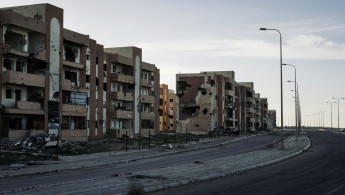Libya's radical Madkhalists are the latest threat
Giza was a populous neighbourhood in Gaddafi's hometown, and in 2015 was chosen by the local Islamic State group franchise to become the capital of its "Caliphate in the Maghreb".
After seven months of fierce fighting, the deaths of 700 soldiers and injuries sustained by 3,000 more, the city was officially retaken on December 6, 2016.
Sixteen months have since passed, yet under the rubble of Sirte there are still hundreds of corpses.
The area of the city facing the sea, the theatre of the final battle, is destroyed and uninhabited. Here there is the wreckage of weapons strewn amid the carbonised cars and the craters from the 500-or-so airstrikes.
Occasionally some resident walks through the ruins of this ghost town in search of a piece of their past.
"I do not like coming back here," says Khaled, with the remains of a ceramic vase in his hands. "I lived in this house for twenty-five years, and for me it is too painful - but my son asks me to go back to look for his stuff. This is why I bring him here once a month."
On the wall of the room that once was his bedroom, Mohammed writes with a marker: "My memories are buried under these stones." On the faded light blue walls are the shadows of his figurines, the remains of Mickey Mouse embedded into the plaster, seared and scorched by mortar shrapnel.
 |
There is no work, schools are struggling to reopen. Infrastructures is largely destroyed and the whole coastal road has been invaded by the stench of the broken sewers |  |
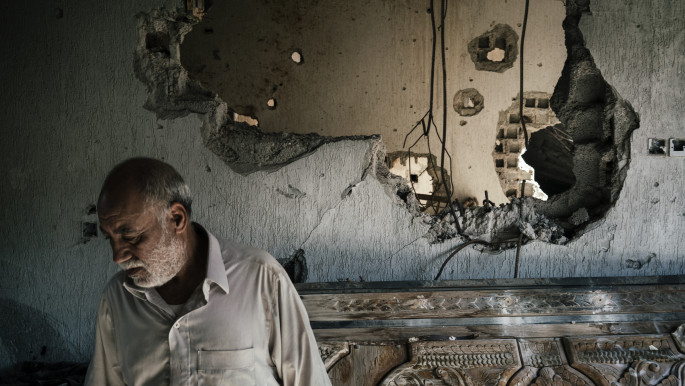 |
|
| Mahmoud Ameesh stands inside the ruins of his house in Sirte's Giza neighbourhood [Getty] |
In a room on the first floor of a destroyed house, a calendar hanging from a wardrobe door is stopped at February 2011 - the date of the Libyan revolution.
Even the hopes of thousands of Libyans seem to have stopped seven years ago.
"The government told us that they would help us," Khaled continues. "But clearly there is always money to fight the enemies, but there is never money to help the victims.
"There are still mines around here, and there is no clean water, our children will get sick and the world has left us, again. Sirte was punished after the revolution, occupied by IS - and now it continues to be punished."
In 2015, IS fighters in northern Africa took advantage of political instability, the power vacuum and old tribal disputes to expand in Libya. And while IS is largely vanquished from this town, these conditions which acted as a catalyst in the rise of the group are far from resolved.
Libya's economy is suffering a major crisis - public employees often don't receive their salaries and there are fewer and fewer who trust the Tripoli government, which is supported by the international community.
The kidnappings and armed assaults are high on people's lists of complaints. In a single week, the military prosecutor Masoud Erhouma was kidnapped by armed men belonging to an unidentified militia, and the convoy of High Council of State chief Abdelrahman Al-Sweihli was ambushed by an armed group in the Gharian area.
The powerful militias of Misrata, the first in the revolt against Gaddafi, were also the most active in the battle of Sirte. They comprised the coalition of forces named Bunyar al-Marsus, which formally has the task of ensuring the security of the city.
"The city is safe," says General Mohammed el-Naas, the Bunyar al-Marsus commander in charge of Sirte's security. "The city was hard hit; 500 US bombings hit the city during the war, about 2,000 buildings have been damaged and certainly there are still hundreds of corpses under the rubble.
"But there is no risk of a return of IS in the city; we have also defeated sleeper cells."
 |
The government told us that they would help us... but clearly there is always money to fight the enemies, but there is never money to help the victims |  |
However, the optimism of Misrata's leaders is undermined by the attacks in the rest of the country.
In recent weeks there have been three attacks claimed by IS in Libya, the latest was a car bomb at a checkpoint in Waddan, central Libya. At the beginning of February an attack on Dahra oil field killed three soldiers of the self-styled Libyan National Army - the militia run by rogue general Khalifa Haftar - and on February 10 another car bomb exploded 90 kilometres east of Sirte, also targeting Haftar's troops.
"They have changed their strategies," continues al-Naas. "They are few, but not less dangerous. Now they act in groups of four, five people at most. They attack the checkpoints. They do not want to conquer anything, they just want to show they can still destabilise the country. IS has maintained a low profile with sporadic attacks since they lost Sirte.
"Since then, the militia have dispersed mostly in the south of the country, an area out of control where there are a few hundred fighters."
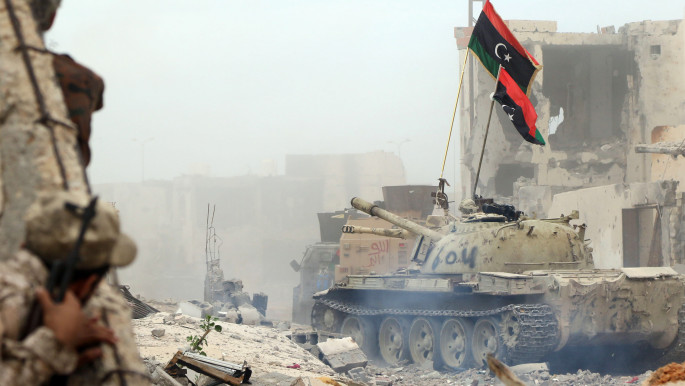 |
|
| Libya's Government of National Accord (GNA) troops advance through Sirte's al-Giza al-Bahriya district in November 2016, during clashes with the Islamic State group [Getty] |
IS targets are still the same: oil facilities and strategic cities, but unlike before, the goal is not to occupy or conquer them, rather to undermine their security and show their presence.
"They have changed the zones of influence," says al-Naas. "Moving from the Tunisian borders to the south. The main routes today are Chad and Sudan. They have alliances with the armed groups of these countries and also with those of Mali, and the non-existent southern borders of Libya guarantee the passage of new recruits and weapons.
"At the moment the deal with these groups is neither ideological nor religious, rather it's necessary to guarantee an income through the trafficking of weapons, drugs and human beings and an armed control of the area. The agreement between these groups and IS works to guarantee mutual economic benefit and a geographical control."
The office of Ismail Shukri, head of Misrata's intelligence agency, is spacious and bare.
On the wall to the right of his desk a screen shows images from the building's CCTV cameras, on the left wall the television broadcasts an Egyptian soap opera.
Shukri has a beige suit, he moves elegantly, he is in the office from early morning and like many fathers in Misrata today, he has not accompanied his children to school. The town's teachers, who have not been paid for months, have been on strike for days.
He shows much less optimism than he did during the war in Sirte, his desk full of papers to sign, but Shukri doodles nervously on a notebook.
"Leave us alone" are the first words he says, almost angrily. "I take the responsibility to pronounce these words, in my role. But it's better if Western countries leave us alone instead of mocking us with non-standing agreements."
 |
It's better if Western countries leave us alone instead of mocking us with non-standing agreements |  |
He was referring to the alleged agreement much publicised by Italy's minister of foreign affairs, Marco Minniti, with the Tebu and Awlad Sulayman tribes in Sebha.
"Those Europe call 'mayors of the south' do not represent anyone," said Shukri. "In Sebha there has been fighting for weeks, several civilians died, hospitals do not know how to cope with the demand, entire neighborhoods are in the hands of armed groups - and we can say that the whole area is less and less Libyan, and always more controlled by militias of neighbouring countries.
"And the international community, after celebrating the liberation of Sirte, has abandoned us. So, it's much better that Europe leaves us alone in solving our problems, because at the moment it has only made them worse."
During the battle for Sirte, groups of IS militants fled to southern Libya, both from Sirte and from Benghazi. Shukri says that among them was a man named Abu Mohad, an Iraqi who - in Shukri's words - played a central role in the hierarchy of the IS organisation and would be reorganising its fighters in the south.
"They also have a training camp around Hurush, 150 kilometres south of Al Jufra," says Shukri. "The desert is out of control and is the safest place for them at the moment. Everyone sees everything, there are Americans in Libya these days who are monitoring the action with their drones. In the past 11 months, the Americans have bombed IS' Libyan posts eight times, which shows that the group is clearly still active and considered a danger by everyone, inside and outside the country."
Lieutenant-General Robert Ashley, the head of the Defense Intelligence Agency, told the Senate Armed Services Committee in written testimony last month: "ISIS in Libya remains a formidable regional terrorist threat, Al Qaeda affiliates in Libya are spreading their influence, particularly in the ungoverned southern region."
These concerns confirmed the latest UN report, from February 12: "ISIS has the ability to conduct complex terrorist attacks" with both "desert units" operating in southern and central Libya and with "sleeping cells" waiting in other parts of the country."
 |
The Madkhalists have an unshakable faith in established authority, despise democracy and Western traditions. Their rejection of elections is one reason they are so popular with dictators |  |
"The extremists for me are all the same: IS, Salafis, Brotherhood, I do not care how they're called," says Shukri. "I'm interested in knocking them down if they put the country in danger. We know here in Misrata and Sirte, the 604th battallion is the next problem."
The 604th infrantry battallion is a brigade created during the Sirte offensive. Its members are Madkhalists, who follow a strain of Islamist thought within the larger Salafist movement.
Madkhalism in Libya is now considered the latest threat.
It is an ultraconservative Salafi trend, founded by a Saudi sheikh, Rabi al-Madkhali, who was invited to Libya in the 1990s by Muammar Gaddafi to oppose jihadists and the Muslim Brotherhood.
The Madkhalists have an unshakable faith in established authority while despising democracy and Western traditions. Their rejection of elections is one reason they are so popular with dictators, and one of the reasons why Gaddafi chose the Madkhalist tribes as allies against the Muslim Brotherhood. The Madkhalists were loyal to him even during the revolution.
Madkhalism was so widespread under Gaddafi that one of his sons, Saadi, joined the group.
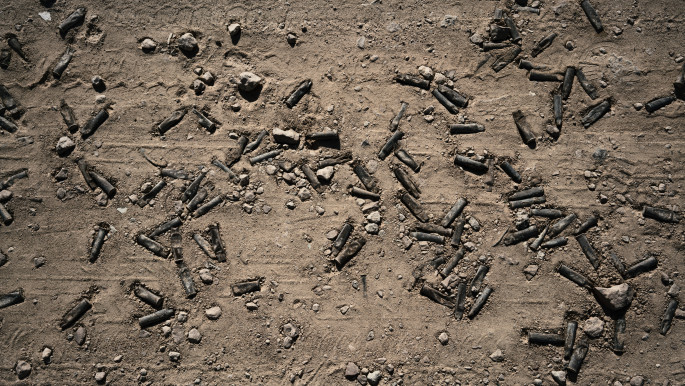 |
|
| Spent ammunition casings are a common site on the streets of Giza [Getty] |
Local sources say Saadi Gaddafi became a Salafist student of Madkhalism and he held several meetings in Tripoli with Madkhal sheikhs who claimed to be jurisprudent experts.
Saadi had strong links with Saudi sheikhs, and at the beginning of the 17 February revolution, Madkhal sheikhs from Saudi Arabia sent a fatwa saying revolution against Gaddafi was "sedition" - telling people to stay home and not take to the streets.
In the months after the revolution, Madkhalists in Libya destroyed historic mosques, shrines and Sufi libraries. They are also suspected of being responsible for the recent assaults on Sufi mosques in the country.
Today the Madkhalists - who currently control more mosques than any other group in Libya - are increasingly widespread in the country.
Their growth makes the balancing act of those committed to national reconciliation all the more difficult.
In the west, the most powerful Madkhalist militia is Rada, run by Abdourfauf Kara. It controls the Mitiga airport and most of the city, as well as the personal security of Fayez al-Sarraj, the prime minister of the UN-backed "Government of National Accord" which sits in Tripoli.
Just a few months ago, Rada militiamen broke into a comic book fair in Tripoli and arrested participants and organisers alike, accusing them of "weakening the religion and being fascinated by foreign traditions".
In the east, the Madkhalists support General Haftar, whose sons Khaled and Saddam, according to local sources, head two Salafi brigades controlling Benghazi with public punishment and arbitrary executions.
When Haftar launched his "Operation Dignity" in eastern Libya, Sheikh Rabi al-Madkhali issued a fatwa on the need for Salafis to support Haftar against the Muslim Brotherhood.
"It was in this context that Haftar dissolved the Salafi brigade of Madkhali known as the Tawhid Brigade and incorporated it into its army, dividing men into various brigades and major military divisions such as the 210th Infantry Regiment and the Sa'iqa Special Forces 302," says Ahmed Sala Ali of the Atlantic Council.
In Misrata and in Sirte, the Madkhalists formed the 604th Brigade, originally to free Sirte from IS - but which has become increasingly threatening and powerful over the past few months.
Many members of the brigade belong to the Farjani tribe, the tribe of Khalifa Haftar. The rogue general claims their support while appearing outside Libya as the one person in Libya defending secularism against Islamic extremism.
"What is happening now," says one local source who asked to remain anonymous for security reasons, "is that the Madkhalists in the east and west are plotting and tightening alliances under the table. Haftar knows it well and more and more often his men come to visit Misrata or are hosted in Tripoli.
"There are Madkhalists linked to Haftar who visit the other Madkhalist groups both in Misrata and Tripoli every week. Our feeling is they are creating the conditions to facilitate the arrival of Haftar in the west, like they did during the war in Sabratha in September. And Tripoli's militias are crucial for these groups, because it is in Tripoli that arrives the money of the Madkhalists."
According to the source, the group receives large deliveries of cash from Saudi Arabia. Sheikh Rabi al-Madkhali also sends audio messages and fatwas to his affiliates through Abu Obeida, a Libyan sheikh who was his Sharia student in Medina, where Madkhali is now based.
"We know that money boxes arrive from Riyadh airport, Rada forces control the airport and arbitrarily decide who and what enters or exits the country," says our source.
"Talk with the Madkhalists is impossibile, they are powerful, militarily well trained, they have their Quran schools in Tripoli and they are more and more numerous. The brother of the former mayor of Misrata is Madkhalist, and even there, in Misrata, they want to influence decisions of the municipal council. They want to enter the institutions and dominate them. It is their strategy now."
 |
They want to enter the institutions and dominate them. It is their strategy now |  |
The source, who fought during the battle for Sirte, recalls that even then it was clear that the Madkhalists would become a problem for the stability of Libya.
"They had their own field hospitals, once they burned the Libyan flag. They did not fight for our country, they fought their own religious war, Salafis against other Salafis."
The imam of the Sirte mosque was a member of the Farjani tribe, and so the mosque became a key goal for the 604th battalion. Many Farjani tribesmen had been killed by IS there in the mosque in 2015.
"They were well trained," the source says. "We all knew we needed them in the battle of Sirte, but at the same time we knew their organisation would become a threat. And now we are seeing what we had foreseen."
The Madkhalists are today moving on three separate fronts, without waging war, rather showing a solid loyalty to the doctrines that they are religiously required to follow.
If, hypothetically speaking, these three groups united into a common front, they would form a powerful capillary ultraconservative bloc, with a single goal - that is to establish a de facto theocracy, influencing Libyan politics without formally taking part in it.
"And this," says our local source, "would be exactly the purpose of their recent meetings."
Ismail Shukri didn't totally reject such a possibility. "In Misrata, the 604th formally depends on the local militias, but something is certainly moving in the shadows."
 |
In Sirte, citizens like Khaled think that Madkhalists act like the Islamic State group |  |
In Sirte, citizens such as Khaled think that Madkhalists act much like the Islamic State group.
"There is not so much difference, now they move like the jihadists at the very beginning: they treat our children very well, and they provide security and services. But it is clear that they have a long-term project.
"It is clear to us, I wonder if it is also for Westerners, who, through Sarraj and Haftar, are supporting and giving credibility to these extremist groups."
The question in the near future will therefore be to understand the long-term targets of the Salafis in Libya - and of the Gulf states that support them - and what the consequences may be of a growing presence of the Madkhali Salafis in Haftar's ranks.
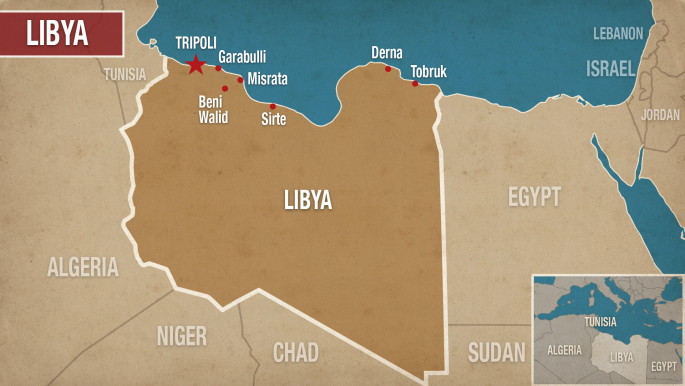 |
|
| The hopes of thousands of Libyans seem to have stopped seven years ago [The New Arab] |
There is a tendency in Western analysis to over-simplify the situation - seeing only secularists facing fundamentalists in Libya - and the risk of reproducing a scheme already seen in the past, when Ansar al-Sharia's affiliates built their consent through police services, city control and growth of their religious institutions, gaining the support of a large part of the population.
But an increasing number of young people are joining the Salafi movements in Libya.
The alliance between Haftar and the Salafi Madkhalists could be extremely useful for both. The Madkhalists aim to have a strong presence in public life, controlling an ever-increasing number of mosques and bringing unemployed youth and other vulnerable segments of society into its tent of support. Meanwhile, Haftar needs popular support and also to increase his troops.
By combining these two elements - popular support and military strength - Haftar may appear, as Libya lurches towards eventual elections, as the only solution to the country's many problems.
The risk is that, in hope of finding stability, foreign governments will blindly support ultraconservative groups - directly or indirectly - which will undoubtedly create more problems in the future.
Now both Sarraj and Haftar are using the the Salafis against their rivals but this co-opting of the Madkhalists - financed and sustained ideologically by the Saudis - risks destabilising the whole of north Africa and radicalising a new generation of young people frustrated and unemployed.
Francesca Mannocchi is a journalist who previously reported from the front lines of the battle for Mosul and on the refugee crisis in Libya.
Follow her on Twitter: @mannocchia
